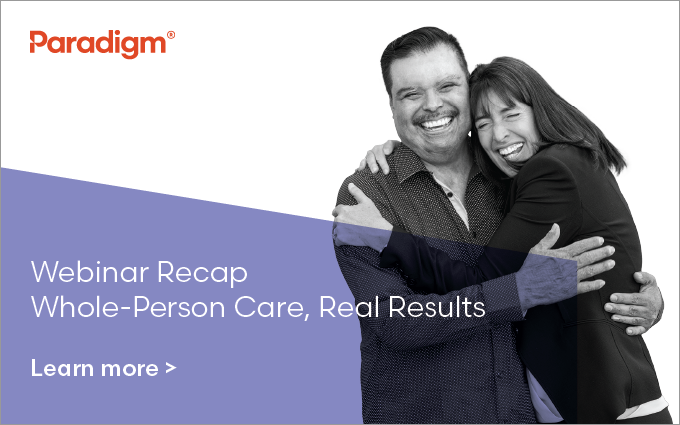05/19/2022

Speakers
Deborah M. Benson, PhD, ABPP, Vice President of Clinical Solutions, Paradigm
Tim Feeney, PhD, Clinical Specialist, Clinical Solutions, Paradigm
Tiffany Morvari, MA, LPCC, Community Support Specialist, Clinical Solutions, Paradigm
Coinciding with Mental Health Awareness Month in May, Paradigm held a CEU webinar to highlight the positive impact of behavioral healthcare management on injury recovery. On Tuesday, May 3, an expert panel discussed a range of topics, including incorporating behavioral healthcare into medical management plans, the importance of early intervention, and coping with external stressors and events like COVID-19 to improve overall recovery and rehabilitation, while lowering the total cost of care.
Injured workers with all types of injuries and levels of severity face behavioral health issues that can seriously impact their recovery journey at all stages. There is a growing understanding in workers’ compensation and the broader healthcare industry that unaddressed behavioral health challenges negatively affect outcomes, raise treatment costs, and delay return to work. Throughout the presentation, the speakers discussed how properly identifying and supporting behavioral health needs is crucial to achieving the best possible outcomes.
The impact of behavioral health on injury recovery
After an introduction by Chief Growth Officer, Kevin Turner, Dr. Deborah Benson began with an overview of behavioral health and how it affects injured workers. The term behavioral health was defined as inclusive of the promotion of mental health, the treatment of mental health and substance use disorders, and the support of not only those directly affected by these issues, but their families and communities as well.
Behavioral health stressors, both preexisting and in response to injury, affect all stages of recovery. Workplace injuries are associated with:
These and other issues can all affect the recovery process. In fact, a study of claims professionals found that psychosocial factors were considered the number one barrier to achieving desired claims outcomes. According to Dr. Benson, there is increasing evidence that supports this perception. For example, a report from the American Hospital Association showed 75% higher costs for people diagnosed with a behavioral health condition than for those without a concurrent behavioral health diagnosis. Addressing these concerns requires a multi-layered solution of problem and risk identification, predictive analytics, engagement of clinical specialists, and implementing strategies to help support injured workers, their families, their providers, and communities to achieve the best possible outcomes.
The role of community support specialists
Next, Tiffany Morvari explained how community support specialists can help patients dealing with behavioral health issues that are impacting outcomes. These specialists can work directly with both case managers and injured workers and their families in several important ways:
Another important topic Tiffany covered was the impact of COVID-19 on behavioral health, including both its direct and indirect effects. Managing behavioral health during the pandemic has required a combination of empathy for the unprecedented situations patients and their families have faced–as well as unique solutions, such as telehealth, to bridge the gaps created by the pandemic.
Finally, Tiffany shared a case study to demonstrate the value of addressing behavioral health aspects of a person’s recovery, by working with a severely injured worker with suboptimal housing, lack of English proficiency, and no local family support. A community support specialist was able to promote recovery through resourcing housing options, Spanish-speaking providers and other community support, and by helping the injured worker establish meaningful and achievable goals to promote his functional independence and community reintegration.
Impact of behavioral health management on outcomes
Dr. Benson highlighted the positive impact that behavioral health specialists can have on care management outcomes. Preliminary analysis of Paradigm case data found that community support specialist engagement was associated with:
The role of clinical specialists in behavioral health management
The final speaker was Dr. Timothy Feeney, who discussed the benefits of advanced clinical behavioral health management expertise, particularly for cases with extremely high complexity of behavioral health issues. According to Dr. Feeney, it’s important to have a framework that helps anyone managing these cases ask the right questions that both guide care and measure the effectiveness of a given care intervention. Examples include:
Dr. Feeney stressed the need to take this flexible framework and use it to begin developing and testing theories for the primary causes of significant behavioral health challenges. From there, care managers can identify the intervention strategies with the best possible chances of being effective.
To illustrate, he shared a case study of a 61-year-old worker who sustained a severe traumatic brain injury after a fall at work. This patient had a preexisting history of family discord and substance abuse that contributed to post-injury impulsive behaviors, family dysfunction, and non-compliance with treatment recommendations. With the help of the community support specialist and criteria-based decision-making, the care management team was able to improve communication strategies in the family, create natural supports, and implement a recovery plan that eventually led to the patient’s being released to return to work.
Webinar resources
Download a replay of the webinar and the presentation slides here. Visit our website to receive invitations for Paradigm’s upcoming webinars.
Throughout Mental Health Awareness Month, we invite you to visit Paradigm social media channels and engage with our posts. The Mental Health Awareness Association also encourages everyone to share awareness information, images, and graphics during May, using the hashtag #MHAM.